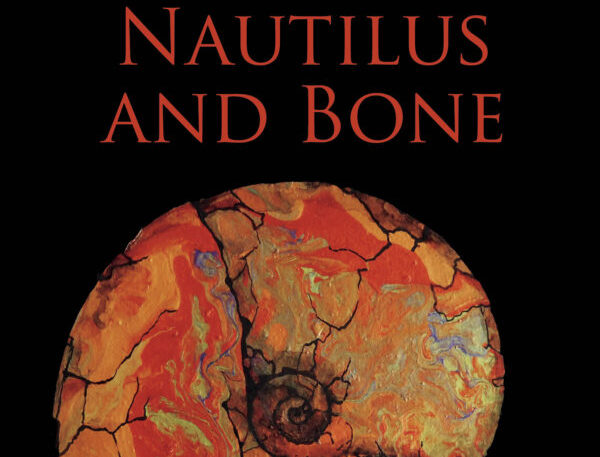
Nautilus and Bone
Lisa Richter
Frontenac House Poetry, 2020
Review by Kim Trainor
I don’t remember where I first encountered the poetry of Anna Margolin (born Rosa Leysenboym), only that I was drawn to her cycle of Mary poems, in which she spoke with such intimacy and eroticism in the voice of Mary—bringing to articulate life this famous Jewish woman who, in the Christian tradition, is so often depicted as silent and suffering.
Lisa Richter’s second volume of poetry, Nautilus and Bone, is a beautiful addition to the sparse biographical material, primarily digital, which exists on Margolin—the exception being Shirley Kumove’s translation of Margolin’s Lider and extensive introduction in Drunk from the Bitter Truth. Richter engages deeply with the life of Margolin, who was born Rosa Leysenboym in Brisk (Brest), Belarus, in 1887, and assumed the pen name of Anna Margolin on her arrival in New York City, where she died in 1952. The collection offers a “hybrid of fact and fiction,” as Richter calls it in her preface—and, in addition to a rich variety of forms, incorporates verses of Margolin’s original poems, quotations by well-known figures of the day (such as Lorca and the anarchist Emma Goldman), smatterings of Yiddish (shlemiel, meshugas), and a snippet from a letter by Reuben Iceland, Margolin’s life-long partner after the disintegration of her second marriage, telling her of the reception of her poems amongst the literati in the Yiddish cafes (“a thousand hypotheses were offered about who might be hiding behind the name, and the general opinion was that it must certainly be a man.”).
Richter plays with many forms: homolinguistic translations (translation from one language into the same language); a Golden Shovel poem; a cento; prose poems; prose poems with slashes. Among the latter, there is one for each of Margolin’s two marriages. I include a segment here from “MARRIAGE #1: MOSHE STAVSKY”:
I am now Rosa Stavsky / signing my new name a hundred times over / the nib slipping over the slopes of the S’s / I cannot discern the boundaries of our skin / the word wife swirling bilious in my mouth / on the twelve-day sea voyage /
Here we see Margolin’s signature (as Rosa Leysenboym, now Stavsky), “nib slipping over the slopes of the S’s,” acknowledging a union of the couple’s bodies as instantiated in her name, a union which can also be read as a lament, a loss of self. Similarly, the use of the forward slashes can suggest violence, rupture, hesitancy; the choppy motion of the boat through Atlantic waves; the cleaving of immigrants from their homeland and from their mother tongue. Blind certainty is severed from love. Richter deftly employs the sensual qualities of language throughout the collection, as here: the liquid l’s, r’s, and w’s “swirling bilious in my mouth,” as if the word “wife” were a bile rising in her throat. Language is slippery, used to anoint their “sea-wracked bodies,” just as elsewhere it can be treacherous: “Jewess, the feminine –ess, the s doubled: two snakes, brandished / like iron daggers in each hand of the Minoan goddess” (“JEWESS”).
There was a thriving Yiddish scene in New York in the first half of the twentieth century, and Margolin was a significant contributor, writing essays, articles, and poems in Yiddish. As Richter notes, Yiddish was, for Ashkenazi Jews of Eastern and Central Europe, “the language of daily life, conversation, family affairs, gossip, folk wisdom, and storytelling. It was the language of secularism, radicalism, anarchism, socialism, and labour organizing.” Yet gender plays a significant role here and threads through the collection:
I do not recognize myself / ambling pregnant / along the bones of future boulevards / now, Moshe, you write in Hebrew more than Yiddish / the language of the future my dear Rosa / Yiddish is weak and womanish / the language of fishwives
(“MARRIAGE #1: MOSHE STAVSKY”)
Just as Margolin ventriloquizes Mary, mother of Christ, Richter imagines Margolin, pregnant with her unwanted son and unable to recognize herself as cultural and religious narratives of maternity and the “language of fishwives” overwrite her.
As Shirley Kumove observes in Drunk from the Bitter Truth, the “Yiddish literary and intellectual world of the Lower East Side that Anna Margolin entered was male-dominated and fiercely competitive. It was not kind to Yiddish women writers and treated them as minor contributors.” Margolin’s Lider (Poems), published in 1929, was apparently well-received but did not have a wide readership; by 1932 she had ceased writing poetry. She was forty-two years old.
The only thing missing from this complex collection is a taste of Margolin’s own Yiddish tongue, as in this excerpt from “Maris Tefila” (Mary’s Prayer), in which she addresses God:
I have built you a nest of love,
a temple of silence.
I am your guardian, handmaiden, and beloved;
and I have never seen your face.
And I lie at the edge of the world,
and you go darkly through me like the hour of death,
like a broad and glittering sword.
(Translation by Lawrence Rosenwald)
In the original Yiddish, here transliterated from the Hebrew orthography, it sounds immediately familiar to an English speaker or to anyone familiar with a language deriving from Germanic roots—as if heard distantly, speech filtered through a closed wooden door. Speak it aloud and hear her original voice:
Ikh hob fun libe geboyt dir a nest
und fun shtilkeyt a templ.
Ikh bin dayn hiterin, dinst un gelibte,
und dayn ponem hob ikh keynmol nit gezen.
Und ikh lig oyfn rand fun der velt,
un du geyst finster durch mir vi di sho fun toyt,
geyst vi a breyte blitsndike shvert.
(“Maris Tefila”)
Kim Trainor is the granddaughter of an Irish banjo player and a Polish faller who worked in logging camps around Port Alberni in the 1930s. Ledi was a finalist for the 2019 Raymond Souster Award. She lives in Vancouver, traditional homelands of the xʷməθkʷəy̓əm, Skwxwú7mesh, and Tsleil-Waututh Nations.